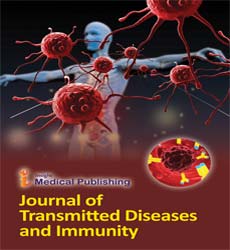Differential proliferation of Wolbachia infections in Aedes mosquito cell lines
Joint Event on 22nd Edition of International Conference on Immunology and Evolution of Infectious Diseases & 12th Edition of International Conference on Tissue Engineering and Regenerative Medicine
May 10-11, 2018 Frankfurt, Germany
Puttaraju H P
Bangalore University, India
Posters & Accepted Abstracts: J Transm Dis Immun
DOI: 10.21767/2573-0320-C2-006
Abstract
The cell lines of Aedes albopictus (C636) obtained at NIMHANS, Karnataka, India are maintained in incubators with M&M insect cell culture medium and BSA to establish Wolbachia infections. The cell lines were inoculated with Wolbachia (A, B and AB super groups) and the strength of the infection was calculated based on the perpetuation of the cells in the in vitro medium. The comparison between control and infected cell lines suggests a two-fold decrease in infected cells reaching confluence. The inoculum strength differs from the source of Wolbachia isolated from different insect hosts. Wolbachia extracts with double infections (AB) are highly virulent than single infections. Among single infections, Wolbachia B super-group is more virulent than A super-group. Further, it was observed that Wolbachia derived from Exorista sorbillans, Aedes albopictus, Trichogramma japonicum has greater virulence and cell lines can be infected within few passages. Wolbachia isolated from Talicada nyseus did not induce any significant effect on mosquito cell lines. The findings of the current study append the database of potential non-native Wolbachia strains that can be introduced in mosquitoes for expression of novel phenotypes. Recent findings reports increased virulence of pathogenic West Nile Virus, when confounded with native Wolbachia strains in mosquitoes. Thus screening of alternative Wolbachia strains that could be maintained in mosquito cell lines and establishing a Wolbachia strain pool for mosquito trans-infection is of significant importance. puttarajuhp@hotmail.com
Google Scholar citation report
Citations : 54
Journal of Transmitted Diseases and Immunity received 54 citations as per Google Scholar report
Abstracted/Indexed in
- Google Scholar
- China National Knowledge Infrastructure (CNKI)
- International Committee of Medical Journal Editors (ICMJE)
- Secret Search Engine Labs
Open Access Journals
- Aquaculture & Veterinary Science
- Chemistry & Chemical Sciences
- Clinical Sciences
- Engineering
- General Science
- Genetics & Molecular Biology
- Health Care & Nursing
- Immunology & Microbiology
- Materials Science
- Mathematics & Physics
- Medical Sciences
- Neurology & Psychiatry
- Oncology & Cancer Science
- Pharmaceutical Sciences

